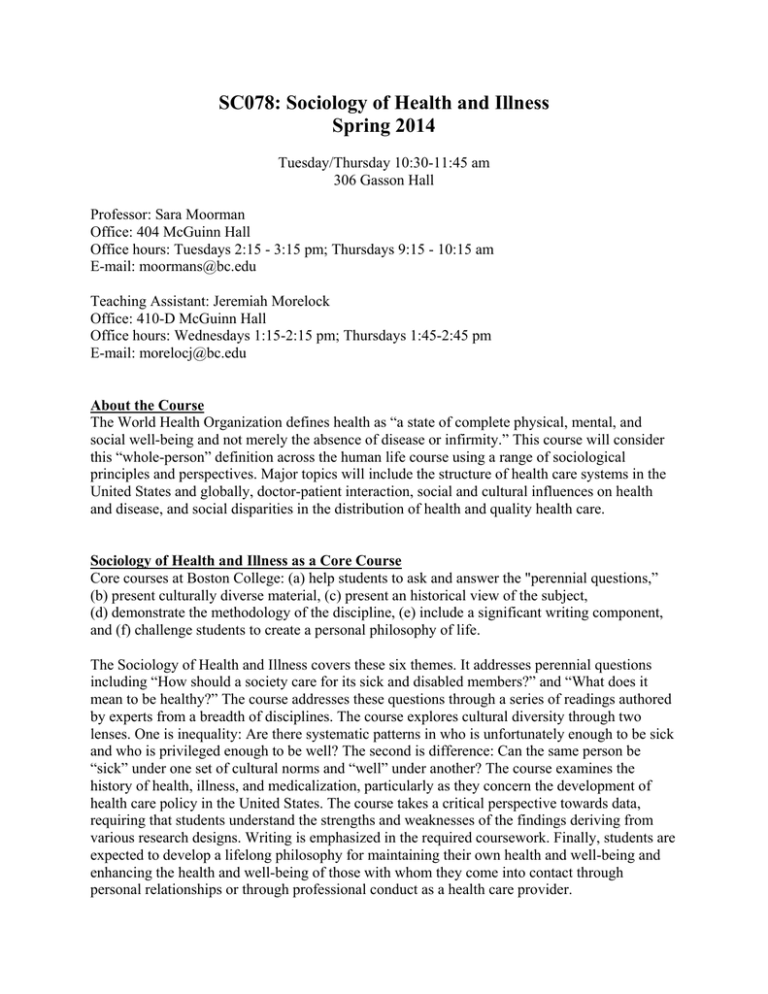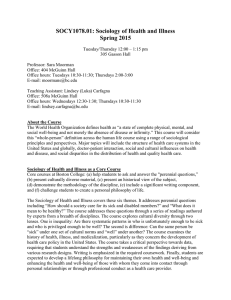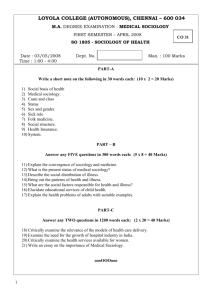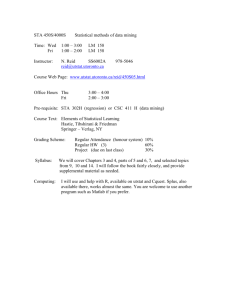SC078: Sociology of Health and Illness Spring 2014
advertisement

SC078: Sociology of Health and Illness Spring 2014 Tuesday/Thursday 10:30-11:45 am 306 Gasson Hall Professor: Sara Moorman Office: 404 McGuinn Hall Office hours: Tuesdays 2:15 - 3:15 pm; Thursdays 9:15 - 10:15 am E-mail: moormans@bc.edu Teaching Assistant: Jeremiah Morelock Office: 410-D McGuinn Hall Office hours: Wednesdays 1:15-2:15 pm; Thursdays 1:45-2:45 pm E-mail: morelocj@bc.edu About the Course The World Health Organization defines health as “a state of complete physical, mental, and social well-being and not merely the absence of disease or infirmity.” This course will consider this “whole-person” definition across the human life course using a range of sociological principles and perspectives. Major topics will include the structure of health care systems in the United States and globally, doctor-patient interaction, social and cultural influences on health and disease, and social disparities in the distribution of health and quality health care. Sociology of Health and Illness as a Core Course Core courses at Boston College: (a) help students to ask and answer the "perennial questions,” (b) present culturally diverse material, (c) present an historical view of the subject, (d) demonstrate the methodology of the discipline, (e) include a significant writing component, and (f) challenge students to create a personal philosophy of life. The Sociology of Health and Illness covers these six themes. It addresses perennial questions including “How should a society care for its sick and disabled members?” and “What does it mean to be healthy?” The course addresses these questions through a series of readings authored by experts from a breadth of disciplines. The course explores cultural diversity through two lenses. One is inequality: Are there systematic patterns in who is unfortunately enough to be sick and who is privileged enough to be well? The second is difference: Can the same person be “sick” under one set of cultural norms and “well” under another? The course examines the history of health, illness, and medicalization, particularly as they concern the development of health care policy in the United States. The course takes a critical perspective towards data, requiring that students understand the strengths and weaknesses of the findings deriving from various research designs. Writing is emphasized in the required coursework. Finally, students are expected to develop a lifelong philosophy for maintaining their own health and well-being and enhancing the health and well-being of those with whom they come into contact through personal relationships or through professional conduct as a health care provider. SC078 Sociology of Health and Illness Page 2 of 6 Academic Honesty Cheating, plagiarism, collusion, and other academic offenses will result in (a) automatic failure of the assignment, and (b) a report to the Dean and the Committee on Academic Integrity. For further information, please review BC’s policies on academic integrity at: www.bc.edu/integrity Accommodations If you are a student with a documented disability seeking reasonable accommodations in this course, please contact Kathy Duggan, (617) 552-8093, dugganka@bc.edu, at the Connors Family Learning Center regarding learning disabilities and ADHD, or Paulette Durrett, (617) 552-3470, paulette.durrett@bc.edu, in the Disability Services Office regarding all other types of disabilities, including temporary disabilities. Advance notice and appropriate documentation are required for accommodations. Assessment Grading scale A+ none at Boston College B+ 87 – 89% C+ 77 – 79% D+ 67 – 69% F below 60% A B C D 93 – 100% 83 – 86% 73 – 76% 63 – 66% Assignments Task Pop quizzes on the reading ABCD- 90 – 92% 80 – 82% 70 – 72% 60 – 62% Percentage of grade 25% Reid point/counterpoint 25% Experience with diagnosis, labeling, and/or the sick role 25% Health inequalities 25% Pop quizzes on the reading: Always come to class having read what’s listed on the schedule for that day. We’ll have occasional unannounced (i.e., “pop”) closed-book quizzes. They will be 2-5 multiple choice, fill-in-the-blank, and/or short answer questions. They’ll cover only the day’s reading—that is, they won’t require you to recall details from previous chapters or books. I will drop your lowest quiz score. Quizzes may not be made up later, unless you have a documented absence. Everything else: Scores on three writing assignments will determine the rest of your grade. I’ll provide you with much greater detail on these assignments as they get closer. Here are the basics: SC078 Sociology of Health and Illness Page 3 of 6 (1) Reid point/counterpoint. T.R. Reid has strong opinions on how to fix the health care system in the United States. For this assignment, you’ll find and read some sources that disagree with him, and then you’ll write a 3-5 page paper taking your own stance on a particular aspect of U.S. health care policy (e.g., insurance coverage of contraception; rationing health care for older adults). (2) Experience with diagnosis, labeling, and/or the sick role. We’ll address what it means, socially, to have a diagnosis (a label) for a set of symptoms of illness, and the way people behave – or feel they are supposed to behave – before and after they have that label. You’ll apply these class concepts in a 2-4 page reflection on your own experiences or the experiences of a friend or loved one. (If you have no personal stories, or don’t wish to tell a personal story, you can instead analyze someone else’s story. There are dozens upon dozens of illness narratives published in books, magazines, and online.) (3) Health inequalities. An extremely important topic in the Sociology of Health and Illness is differences in health that are caused by race/ethnicity, social class, gender, age, marital status, immigration status, and/or a number of other social factors. Because the semester is just not long enough to do everything, we’re giving this topic fairly short shrift in class. So for this assignment, you’ll choose a topic, research it yourself, and write a 5-7 page paper about it. Blackboard Visit the Blackboard page for this course regularly for announcements, grades, course materials, a copy of the syllabus, etc. I promise you that everything you’ve ever needed (or wanted) to know about this course is posted, so look before you e-mail. If you e-mail me and don’t get an answer within 48 hours, it’s because you don’t need me to tell you the answer to your question. Extra Credit Any extra credit opportunities will be made available to the entire class, and will be announced both in class and on Blackboard. Late Paper Policy Papers submitted after 11:59 pm on the due date will lose a letter grade per day. For example, a paper submitted between midnight and 11:59 pm of the day following the due date is worth, at best, a B. Do not ask me for personal extensions. You must provide proof of extenuating circumstances (e.g., a note from the infirmary or from your academic dean) to avoid the late penalty. SC078 Sociology of Health and Illness Page 4 of 6 Required Books The bookstore has ordered: Conrad, Peter. 2007. The Medicalization of Society. (ISBN 080188585) Goffman, Erving. 1963. Stigma. (ISBN 671622447) Reid, T. R. 2010. The Healing of America. (ISBN 143118213) Watters, Ethan. 2010. Crazy Like Us. (ISBN 416587095) These books are also available on 2-hour reserve at O’Neill Library. If you need support to buy books, please contact the Montserrat Coalition—go to Brock House at 78 College Road, call 617-552-8865, or e-mail Paula Dias at paula.dias@bc.edu. Schedule See page 5 below. Submitting Papers No later than 11:59 pm on the paper due date: (1) Go to the website www.dropitto.me/moormans (2) Enter the password SC078 (3) Browse for your file, then click “Upload.” SC078 Sociology of Health and Illness Date Topic January 14 Introduction January 16 Health care systems and reform Page 5 of 6 Reading Reid prologue, chapters 1 & 2 January 21 Reid chapters 3 & 4 January 23 Reid chapters 5 & 6 January 28 Reid chapters 7 & 8 January 30 Reid chapters 9 & 10 February 4 Reid chapters 11 & 12 February 6 Reid chapter 13, afterword, appendix February 11 Diagnosis, labeling, and the sick role Due Goffman chapter 1 February 13 Goffman chapter 2 February 18 Goffman chapter 3 February 20 Goffman chapters 4 & 5 February 25 On Being Sane in Insane Places (see Blackboard) February 27 The Gomer Phenomenon (see Blackboard) March 4 Spring break ***No Class*** March 6 Spring break ***No Class*** March 11 Social constructions of health and illness Conrad chapter 1 March 13 Conrad chapter 2 March 18 Conrad chapter 3 March 20 Conrad chapter 4 Reid point / counterpoint SC078 Sociology of Health and Illness Date Reading Due March 25 Conrad chapter 5 Experience paper March 27 Conrad chapter 6 April 1 Conrad chapter 7 April 3 Conrad chapter 8 April 8 Watters introduction & chapter 1 April 10 Watters chapter 2 April 15 Watters chapter 3 April 17 Topic Page 6 of 6 Holy Thursday April 22 April 24 ***No Class*** Watters chapter 4 & conclusion Interaction between health care practitioners and patients Watching Brian Die: The Rhetoric and Reality of Informed Consent (see Blackboard) April 29 Behavior in Pubic Places: The Sociology of the Vaginal Exam (see Blackboard) May 1 What ‘Patient Centered’ Should Mean (see Blackboard) Health inequalities



